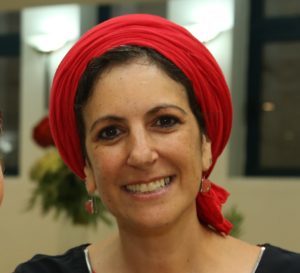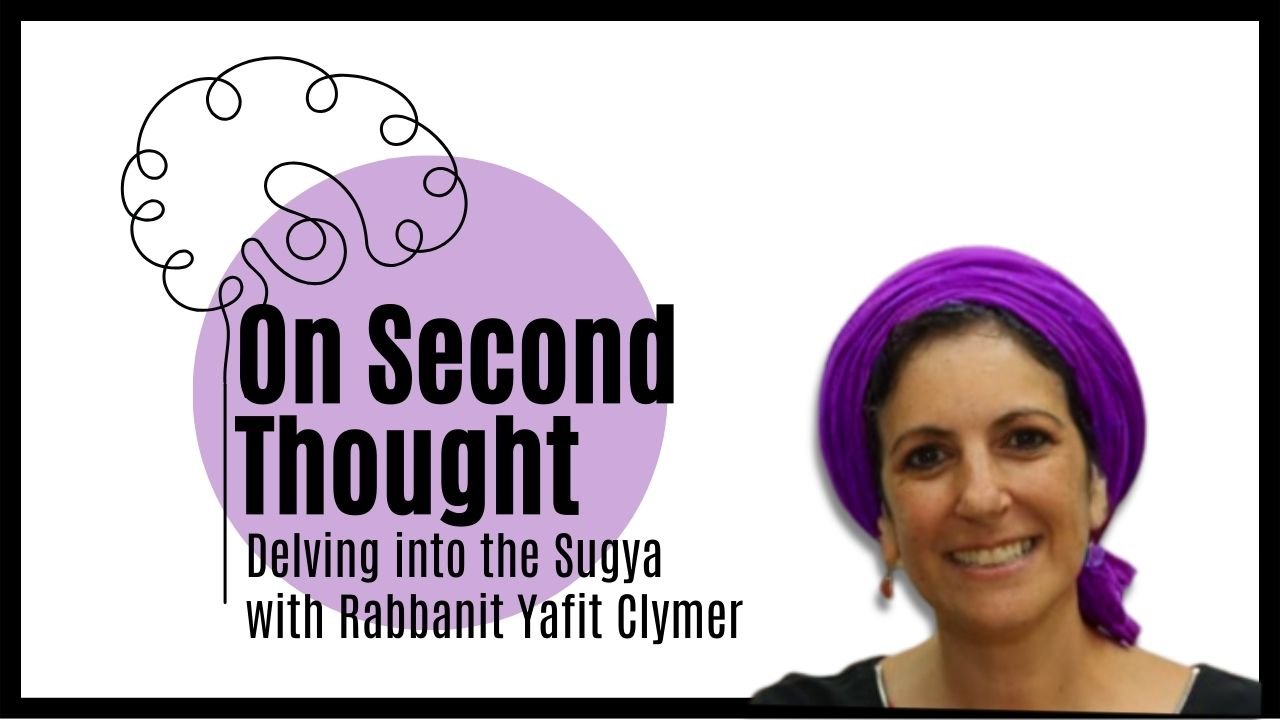On Second Thought: Delving Into the Sugya with Rabbanit Yafit Clymer
Other episodes: On Second Thought
Listen here:
Watch here:
Sources:
בשני מקומות במקרא מתואר חג השבועות בדגש של השבועות הנספרים:
במדבר כ”ח כו-כז
וּבְי֣וֹם הַבִּכּוּרִ֗ים בְּהַקְרִ֨יבְכֶ֜ם מִנְחָ֤ה חֲדָשָׁה֙ לַֽה’ בְּשָׁבֻעֹ֖תֵיכֶ֑ם מִֽקְרָא־קֹ֙דֶשׁ֙ יִהְיֶ֣ה לָכֶ֔ם כׇּל־מְלֶ֥אכֶת עֲבֹדָ֖ה לֹ֥א תַעֲשֽׂוּ׃
On the day of the first fruits, your Feast of Weeks, when you bring an offering of new grain to יהוה, you shall observe a sacred occasion: you shall not work at your occupations.
וְהִקְרַבְתֶּ֨ם עוֹלָ֜ה לְרֵ֤יחַ נִיחֹ֙חַ֙ לַֽה’ פָּרִ֧ים בְּנֵי־בָקָ֛ר שְׁנַ֖יִם אַ֣יִל אֶחָ֑ד שִׁבְעָ֥ה כְבָשִׂ֖ים בְּנֵ֥י שָׁנָֽה׃
You shall present a burnt offering of pleasing odor to יהוה: two bulls of the herd, one ram, seven yearling lambs.
דברים ט”ז ט-י
שִׁבְעָ֥ה שָׁבֻעֹ֖ת תִּסְפׇּר־לָ֑ךְ מֵהָחֵ֤ל חֶרְמֵשׁ֙ בַּקָּמָ֔ה תָּחֵ֣ל לִסְפֹּ֔ר שִׁבְעָ֖ה שָׁבֻעֽוֹת׃
You shall count off seven weeks; start to count the seven weeks when the sickle is first put to the standing grain.
וְעָשִׂ֜יתָ חַ֤ג שָׁבֻעוֹת֙ לה’ אֱ-לֹהֶ֔יךָ מִסַּ֛ת נִדְבַ֥ת יָדְךָ֖ אֲשֶׁ֣ר תִּתֵּ֑ן כַּאֲשֶׁ֥ר יְבָרֶכְךָ֖ ה’ אֱ-לֹהֶֽיךָ׃
Then you shall observe the Feast of Weeks for your God יהוה, offering your freewill contribution according as your God יהוה has blessed you.
אז למה 7 ?
מדרש ויקרא רבה כ״ט:י״א :
כל השביעין חביבין.
All the seven months are beloved.
ירמיהו פרק ה’ פס כ”ד
וְלֽוֹא־אָמְר֣וּ בִלְבָבָ֗ם נִ֤ירָא נָא֙ אֶת־ה’ אֱ-לֹהֵ֔ינוּ הַנֹּתֵ֗ן גֶּ֛שֶׁם (וירה) [יוֹרֶ֥ה] וּמַלְק֖וֹשׁ בְּעִתּ֑וֹ שְׁבֻעֹ֛ת חֻקּ֥וֹת קָצִ֖יר יִשְׁמׇר־לָֽנוּ׃
They have not said to themselves, “Let us revere the ETERNAL our God,
Who gives the rain, The early and late rain in season,
Who keeps for our benefit The weeks appointed for harvest.”
רש”י –
שבועות חוקות קציר. שבעה שבועות שחקק לנו בהן שתי חוקות קציר חק העומר וחק שתי הלחם:
the weeks of the laws of harvest Seven weeks in which He ordained two ordinances of harvest, the ordinance of the omer, and the ordinance of the two breads.
המלב”ים:
שבועות חקות קציר, שיהיה חום ושמש בימי הקציר ולא ירדו גשמים אז, שזה מצד טבע הזמן, וגם בזה אנו צריכים אליו שלא ישנה את הטבע הכולל ע”י רוע מעשינו רק יניח הטבע כמו שהוא, וז”ש ששבועות חקות קציר (הם שבעה שבועות מן הפסח עד העצרת שהם ימי הקציר), ישמר לנו שישמור הטבע ולא ישנה.
The weeks that imitate the harvest, that there will be heat and sun during the days of the harvest and no rain will fall at that time, which is from the nature of time, and in this too we need Him not to change the overall nature through the evil of our actions, but to leave nature as it is, and God, the weeks that imitate the harvest (they are seven weeks from Pesach to the assembly, which are the days of the harvest), will preserve for us that nature will preserve and not change.
בראשית כ”ו ל-לג בסיפור השבועה שבין יצחק לאנשי גרר:
וַיַּ֤עַשׂ לָהֶם֙ מִשְׁתֶּ֔ה וַיֹּאכְל֖וּ וַיִּשְׁתּֽוּ׃
Then he made for them a feast, and they ate and drank.
וַיַּשְׁכִּ֣ימוּ בַבֹּ֔קֶר וַיִּשָּׁבְע֖וּ אִ֣ישׁ לְאָחִ֑יו וַיְשַׁלְּחֵ֣ם יִצְחָ֔ק וַיֵּלְכ֥וּ מֵאִתּ֖וֹ בְּשָׁלֽוֹם׃
Early in the morning, they exchanged oaths. Isaac then bade them farewell, and they departed from him in peace.
וַיְהִ֣י ׀ בַּיּ֣וֹם הַה֗וּא וַיָּבֹ֙אוּ֙ עַבְדֵ֣י יִצְחָ֔ק וַיַּגִּ֣דוּ ל֔וֹ עַל־אֹד֥וֹת הַבְּאֵ֖ר אֲשֶׁ֣ר חָפָ֑רוּ וַיֹּ֥אמְרוּ ל֖וֹ מָצָ֥אנוּ מָֽיִם׃
That same day Isaac’s servants came and told him about the well they had dug, and said to him, “We have found water!”
וַיִּקְרָ֥א אֹתָ֖הּ שִׁבְעָ֑ה עַל־כֵּ֤ן שֵׁם־הָעִיר֙ בְּאֵ֣ר שֶׁ֔בַע עַ֖ד הַיּ֥וֹם הַזֶּֽה׃ {ס}
He named it Shibah; therefore the name of the city is Beer-sheba to this day.
זכריה ח טז-יז
אֵ֥לֶּה הַדְּבָרִ֖ים אֲשֶׁ֣ר תַּֽעֲשׂ֑וּ דַּבְּר֤וּ אֱמֶת֙ אִ֣ישׁ אֶת־רֵעֵ֔הוּ אֱמֶת֙ וּמִשְׁפַּ֣ט שָׁל֔וֹם שִׁפְט֖וּ בְּשַׁעֲרֵיכֶֽם׃
These are the things you are to do: Speak the truth to one another, render true and perfect justice in your gates.
וְאִ֣ישׁ ׀ אֶת־רָעַ֣ת רֵעֵ֗הוּ אַֽל־תַּחְשְׁבוּ֙ בִּלְבַבְכֶ֔ם וּשְׁבֻ֥עַת שֶׁ֖קֶר אַֽל־תֶּאֱהָ֑בוּ כִּ֧י אֶת־כׇּל־אֵ֛לֶּה אֲשֶׁ֥ר שָׂנֵ֖אתִי נְאֻם־ה’׃ {פ}
Not a single one of you shall contrive evil against another; and do not love perjury, because all those are things that I hate—declares GOD.
מסכת שבועות מ”ז ע”א
חָזְרָה שְׁבוּעָה לִמְקוֹמָהּ. לְהֵיכָן חָזְרָה? אָמַר רַבִּי אַמֵּי, רַבּוֹתֵינוּ שֶׁבְּבָבֶל אָמְרוּ: חָזְרָה שְׁבוּעָה לְסִינַי, רַבּוֹתֵינוּ שֶׁבְּאֶרֶץ יִשְׂרָאֵל אָמְרוּ: חָזְרָה שְׁבוּעָה לַמְחוּיָּב לָהּ.
- Rabbi Yosei rules in the mishna that in a case where both sides are suspect and cannot take an oath, the oath returned to its place. The Gemara asks: To where did it return? What is meant by the oath returning to its place? Rabbi Ami said that our Sages in Babylonia say: The oath returned to Sinai, where God administered an oath to the Jewish people that they would keep the mitzvot of the Torah, including the prohibition against robbery. The litigant who is robbing the other will be punished by God, not the court. Our Sages in Eretz Yisrael said: The oath returned to the one who was initially liable to take it, i.e., the defendant, and since he is disqualified from taking an oath, he must pay.
הרב יונתן זקס, שיג ושיח לפרשת אמור
אנחנו ישויות רוחניות, אבל גם גשמיות. איננו יכולים להיות רוחניים וקרובים לה’ כל הזמן. נחוצים לנו זמנים של קודש אך גם זמנים של חול. ליום אחד מכל שבעה אנחנו מפסיקים לעבוד ומתייחדים עם אלוהי הבריאה. בימים קבועים בשנה, ימי החגים, אנו מהללים את א-להי ההיסטוריה. קדושת השבת נקבעת בידי ה’ לבדו מפני שרק הוא ברא את העולם; ואילו קדושת החגים נקבעת במידה מסוימת בידי אדם (בקידוש החודש על פי מראה הלבנה, למשל, או בקביעת לוח השנה), מפני שההיסטוריה היא שותפות בינינו לבין אלוהים. אולם משתי בחינות השבתות והחגים זהים. אלו ואלו זמני התוועדות, מועדים; ובאלו כן באלו אנו מרגישים שאנו קרואי־קודש, נקראים ומזומנים ומוזמנים להיות אורחיו של הקב”ה. השבתות והחגים הם מועדי ה’, מקראי קודש. איננו יכולים להיות רוחניים כל הזמן. אלוהים נתן לנו עולם חומרי ועלֵינו לפעול בו. אבל ביום השביעי בשבוע, ובשבעה ימים טובים הפזורים לאורך השנה, ניתן לנו זמן מקודש המוקדש להתקרבות אל השכינה, זמן שאנו נשטפים בו באורה הקורן של אהבת ה’.
We are spiritual beings but we are also physical beings. We cannot be spiritual, close to God, all the time. That is why there is secular time as well as holy time. But one day in seven, we stop working and enter the presence of the God of creation. On certain days of the year, the festivals, we celebrate the God of history. The holiness of Shabbat is determined by God alone because He alone created the universe. The holiness of the festivals is partially determined by us (i.e., by the fixing of the calendar), because history is a partnership between us and God. But in two respects they are the same. They are both times of meeting (mo’ed), and they are both times when we feel ourselves called, summoned, invited as God’s guests (mikra kodesh).
We can’t always be spiritual. God has given us a material world with which to engage. But on the seventh day of the week, and (originally) seven days in the year, God gives us dedicated time in which we feel the closeness of the Shechinah and are bathed in the radiance of God’s love.
![]()
Hadran’s Beyond the Daf shiurim are also available by podcast on
Beyond the Daf is where you will discover enlightening shiurim led by remarkable women, delving deep into the intricacies of Talmudic teachings, and exploring relevant and thought-provoking topics that arise from the Daf.





